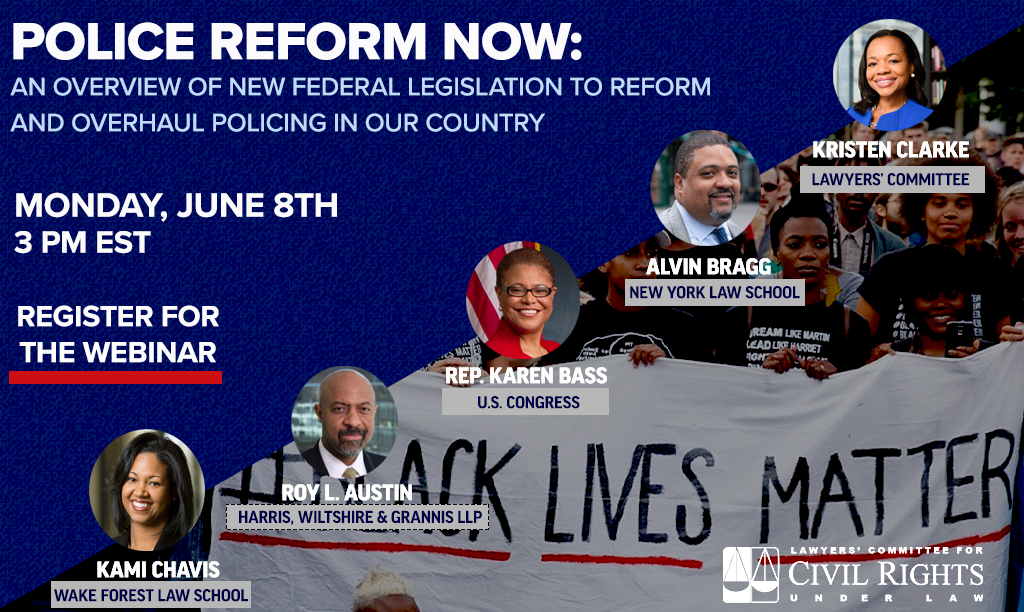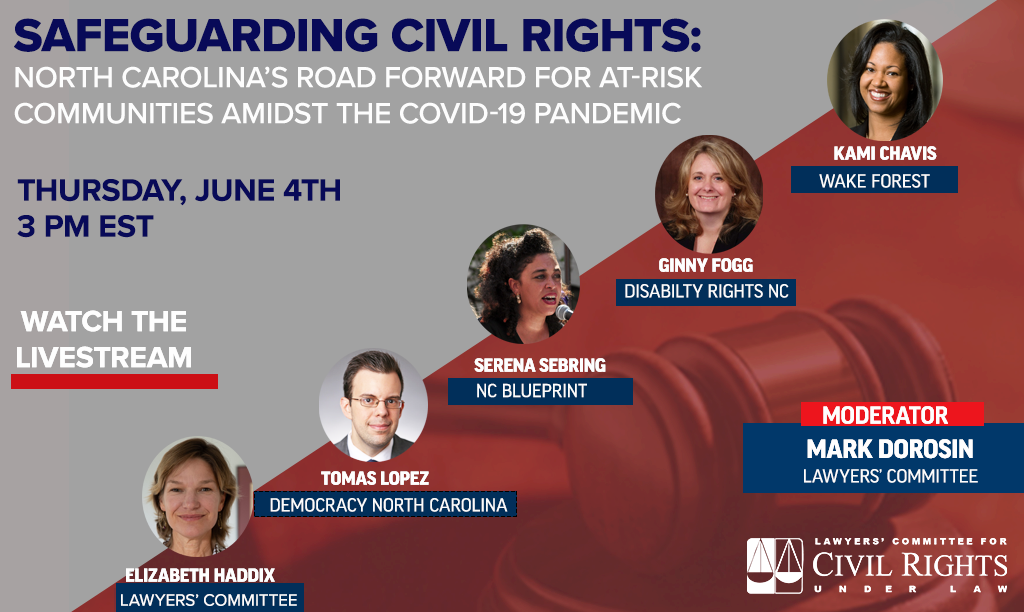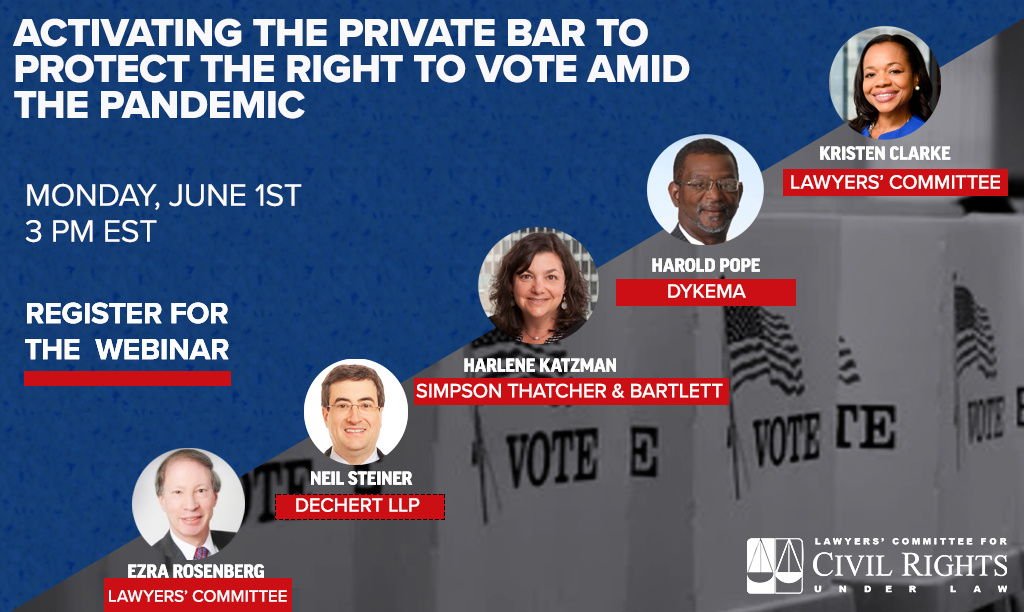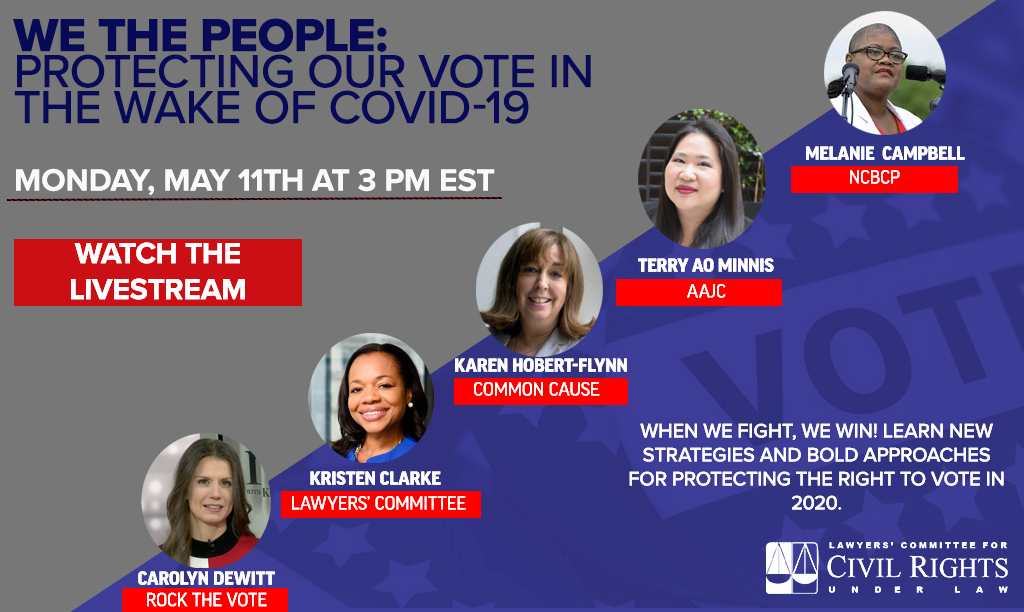Virtual Event Library
New SCOTUS Term – Three Key Cases You Need to Know About
Join the Lawyers’ Committee for Civil Rights Under Law for an inside look at three of the first cases argued before the U.S. Supreme Court for the October 2023 term that have significant civil rights implications.
A Briefing on Artificial Intelligence and Civil Rights
On September 28, The Lawyers’ Committee held a briefing with Senator Cory A. Booker and leading advocates about artificial intelligence and civil rights. Bringing together lawmakers, academics, advocates, affected citizens, and congressional staff.
From Bad to Worse
Why the ACE Act is the most anti-democratic federal voting law in the past 20 years.
Insights and Implications from the SFFA v. Havard & UNC Rulings
The Supreme Court of the United States ruled on two affirmative action cases on June 29, 2023 – Students for Fair Admissions (SFFA) v. University of North Carolina and SFFA v. Harvard College. In each of these cases, SFFA challenged not only whether the universities’ policies comport with the Supreme Court’s 45-year precedent authorizing race-conscious admissions in higher education, but also whether that precedent should be overturned. While the focus of these cases is college admissions, many are concerned that the implications of the rulings, which reversed the 45-yar precedent, could have broader reach—beyond the halls of higher education and into the boardrooms and breakrooms of the nation’s corporations. With such significant stakes, clarity on the law and the context of these cases is critical to in-house counsel’s ability to provide sound advice. In this webcast, held in partnership with the Lawyers’ Committee for Civil Rights under Law (which argued the University of North Carolina case in the SCOTUS), legal and diversity experts analyzed the potential impact the ruling might have on organizations and the business and corporate legal communities at-large.
Ensuring Equal Employment Opportunity: Supreme Court Affirmative Action Decisions and the Workplace
The Supreme Court will soon issue a ruling that will consider the lawfulness of affirmative action in college admissions decisions. Panelists will discuss the limited application of the Supreme Court’s ruling to employer practices, including DEIA measures, under Title VII of the Civil Rights Act, which prohibits workplace discrimination on the basis of race, ethnicity, and other protected categories. Panelists will also discuss the lawfulness and importance of employer initiatives to create opportunities and foster workplaces free from discrimination, particularly for Black workers and other workers who continue to face significant barriers in accessing good jobs.
Freedom to Learn #Frontlines Read-In
Since the summer of 2020, an emboldened and well-resourced faction in the United States has declared war on hard-fought advances in civil and human rights, social justice, and democratic participation. They have attacked librarians, surveilled and harassed teachers, canceled classes, banned books, weaponized frameworks like Critical Race Theory, and more. This assault on the freedom of the next generation to learn their collective history and its impact on the present, is an assault on democracy itself.
Under the Bridge
The Need for Reparations in Selma and Byond
Reaching Accountability: Policing, Race, and Policy
The death of Tyre Nichols at the hands of Memphis police officers has reignited questions about the possibility of meaningful police accountability and what true public safety looks like for Black communities. None of these questions are new, but we understand that we must continue to collectively strive for answers.
Join the Lawyers’ Committee for an important discussion on pathways to police accountability in 2023 and beyond. Panelists for this discussion include former federal prosecutor Lola Velazquez-Aguilu, Director of William & Mary Center for Criminal Justice Policy and Reform Prof. Kami Chavis, Executive Director, Washington Lawyers’ Committee for Civil Rights and Urban Affairs Jonathan Smith, Director of Lawyers’ Committee’s Criminal Justice Project Arthur Ago and President & Executive Director of the Lawyers’ Committee, Damon Hewitt.
Affirmative Action Cases: The Work Ahead
On October 31, 2022, the United States Supreme Court will hear oral argument on the upcoming cases challenging affirmative action and race-conscious admissions: SFFA v. University of North Carolina-Chapel Hill (UNC) and SFFA v. Harvard. These cases are a reminder that education has always been a battleground for civil rights and it is imperative that we press forward for greater racial equity and inclusion in higher education
Join leading civil rights litigators and advocates from the Lawyers’ Committee for Civil Rights Under Law, Legal Defense Fund, Asian Americans Advancing Justice – AAJC, and African American Policy Forum to discuss the cases’ implications, reflect on lessons from oral argument, and provide a roadmap for how we move forward as a community leading up to and following the decisions. This webinar will serve as a reminder of how far we have come and how far we still need to go in order to reap the educational benefits that flow from multiracial and inclusive learning environments and address the needs of all communities.
The 2021-22 SCOTUS Term: What It Means for Civil Rights & What’s Next
During the Supreme Court’s current term, it is addressing issues relating to abortion care, voting rights, gun violence prevention, and other issues that will have a significant impact on communities of color. Join Jon Greenbaum, Chief Counsel of the Lawyers’ Committee for Civil Rights Under Law; Danielle Holley-Walker, Dean of Howard University School of Law; Hon. Shira Scheindlin, Retired Judge of the United States District Court for the Southern District of New York; and Deepak Gupta, Appellate Advocate & Founding Principal at Gupta Wessler for a review of the term and what it means for the future of civil rights and racial justice.
Hidden In Plain Sight: Improving Demographic Data Collection To Combat Racial Health Disparaties
For too long, data gathering efforts in the United States have been haphazard and inequitable, failing to consider the nuances of different communities and identities. This means that information on racial health disparities and the true impact of systemic inequities in healthcare has remained incomplete. As a result, individuals and communities that are hit the hardest by health crises, like the COVID-19 pandemic, often do not receive the resources they need and deserve. The unique needs of individuals living at the intersections of multiple marginalized identities are almost entirely unaddressed. Nearly 3 years into the pandemic, we can’t wait any longer. This webinar will address the dire need for reliable, comprehensive, disaggregated demographic data to address health disparities and present solutions for better data collection practices.
The CROWN Act: Federal Protection for Black Natural Hairstyles
The webinar opens with a conversation with Damon Hewitt, President & Executive Director of the Lawyers’ Committee for Civil Rights and Rep. Bonnie Watson Coleman, sponsor of the CROWN Act and co-founder and co-chair of the Congressional Caucus on Black Women and Girls. This webinar also features a virtual panel with Prof. Wendy Greene, the founder of the #FreetheHair movement and national leader in the development of the CROWN Act; Joi Chaney, Executive Director, Washington Bureau and Senior Vice President, Policy and Advocacy at National Urban League; Lisa Cylar Barrett, Director of Policy at the NAACP Legal Defense & Educational Fund; and Brenda Morrison, who successfully advocated for the CROWN Act to be passed in Broward County. The panel will be moderated by Phylicia Hill, Counsel at the Lawyers’ Committee and leader of our work on the CROWN Act.
2021 Higginbotham Leadership Awards Celebration
Democracy promises the free and full participation in civic life for all. The Higginbotham Awards Gala is about celebrating those who strive to uphold the promises of democracy through their leadership in our communities and workplaces. Join the Lawyers’ Committee to celebrate the accomplishments in the fight for racial justice, voting rights, and economic equality and help fuel the work towards true freedom for all.
Democracy On The Line: Racial Justice & The Fight for Voting Rights
In this webinar, The honorable Congresswoman Terri A. Sewell of Alabama joins our president and executive director Damon Hewitt for a conversation about the state of our democracy, achieving racial justice, and the fight for voting rights—especially redistricting and the critical voting rights legislation pending before Congress. Congresswoman Sewell is the lead sponsor of the John Lewis Voting Rights Advancement Act, which would address the ways the U.S. Supreme Court undermined the Voting Rights Act in recent years.
Racial Equity in Higher Education: Increasing BIPOC Access in Ohio and Nationwide
This webinar will address high-impact public policy interventions and university-level initiatives that aim to remove those barriers throughout the prekindergarten to college pipeline. The conversation will also highlight the critical role of student and alumni leadership in developing equity-based policies that increase access and completion rates for BIPOC students.
The REASON Project: Racial Equity in Higher Education in Illinois & Beyond
The Lawyers’ Committee for Civil Rights Under Law, with support from the Joyce Foundation, launched the REASON Project, a two-year initiative to work with key state stakeholders to increase access and promote diversity, equity, and inclusion for low income student of color at higher education institutions in the Great Lakes region.
Redistricting 101: Building Community Power
Fred McBride, Redistricting and Voting Rights Policy Specialist with the Lawyers’ Committee for Civil Rights Under Law, will discuss resources available to help community groups with the redistricting process, gerrymandered districts, and more.
The For the People Act: A Bold Step Forward for Voting Reform
A discussion of key provisions of the For the People Act, including automatic and same-day registration, early and absentee voting, and rights restoration for people with felony convictions. This event features three voting rights experts, Marcia Johnson-Blanco from the Lawyers’ Committee for Civil Rights, Myrna Perez from the Brennan Center for Justice, and Jorge Vasquez from the Advancement Project.
The Maryland HBCU litigation: A Fifteen-Year Struggle for Justice and Educational Opportunity
Police Accountability: Leveraging This Moment and The Road Ahead
The Fight to Vote: Countering Suppression in the Courts and Coalition
2020 Virtual Lawyers’ Committee Awards
Defending Democracy | Election Debrief
Debrief | Election 2020
Barrett Briefing: What’s At Stake for Women & POC
The recent Supreme Court nomination of Amy Coney Barrett to fill the late Justice Ruth Bader Ginsburg’s seat during the already underway presidential election presents many challenges and threats to the future of civil rights and access to health care in the United States. Join the Lawyers’ Committee for Civil Rights Under Law and the National Women’s Law Center for a special briefing on what’s at stake for people of color and women with the nomination of Judge Barrett to the high court.
2020 Higginbotham Virtual Gala
Join us Thursday, Sept 17th at 3 pm EST for the virtual 20th Anniversary Higginbotham Award event. We will salute UPS Executive Chairman, David Abney with the A. Leon Higginbotham Award; the Honorable Karen Bass with the Legacy of Justice Award; attorney Ben Crump with the Trailblazer Award; business leader and philanthropist, Robert Smith with the Robert F. Kennedy Justice Prize; and Pulitzer Prize-winning reporter, Nikole Hannah-Jones with the Beacon of Justice Award. Also, City of Atlanta Mayor, the Honorable Keisha Lance Bottoms will receive the Distinguished Civil Rights Advocate Award.
#SaveTheUSPS
The United States Postal Service is under attack. Under the leadership of the new Postmaster General and Trump megadonor, Louis DeJoy, the agency has been upended with dramatic changes that could impact timely delivery of mail. Join this emergency program to find out action steps that can be taken to avert this crisis and to learn accurate information about how you can vote by mail in your state.
Demystifying Judicial Clerkships
Judicial clerkships are an important and powerful experience for law school graduates. Securing and preparing for a federal clerkship can be a daunting task for even the best law students. What is the experience of serving as a clerk look like? What are judges looking for in applicants? What should you expect during an interview? Are there steps that you can take to make yourself an exceptional candidate? Join us for this webinar to learn more about judicial clerkships.
Civil Rights and the Supreme Court: October 2019 End-of-Term Briefing
During the Supreme Court’s October 2019 term, the Court issued numerous decisions impacting voting rights, employment protections for the LGBT community, access to abortion care, the death penalty, and the fate of the Obama-era DACA program. Join Kristen Clarke, President and Executive Director, of the Lawyers’ Committee for Civil Rights Under Law for a review of these and other important cases, and what the decisions mean for the future of civil rights and racial justice. With opening remarks from Tona Boyd, Chief Counsel to Senator Cory Booker (D-NJ).
Advocacy In The Wake of Hate
Join the James Byrd Jr. Center to Stop Hate on Tuesday, June 16th for a conversation on advocacy in the wake of hate. We’ll hear from family members of hate crime victims to learn about how, in the wake of tragedy, they were able to advocate for a better response to hate crimes. Community activists and legal experts will provide context for the discussion with an overview of hate crime law. Given current events, it promises to be an especially relevant and moving conversation.

Police Reform Now: An Overview of New Federal Legislation to Reform & Overhaul Policing
Two weeks following the tragic death of George Floyd, Congress will introduce new legislation to put in place comprehensive policing reform. In advance of upcoming hearings, join experts to get fresh perspective on the bill and learn action steps that you can take to advance policing reform in your community.

As of May 19, North Carolina health officials say for the first time, that all 100 counties in the state have reported lab-confirmed cases of COVID-19. The virus has led to hundreds of deaths and counting, economic hardship, community and educational upheaval, and tens of thousands of citizens hospitalized or in recovery. Even worse, African-Americans in North Carolina account for about 22% of the state’s population but represent more than 38% of Covid-19 fatalities.

The current 2020 election cycle presents a number of new challenges in the wake of the pandemic. This panel will provide outline the current litigation landscape and review key cases that impact access to the ballot. Focus will be provided on absentee balloting and recent experiences in Ohio, Wisconsin and Maryland. Panelists will also explore potential reforms that can be put in place to expand access and consider the potential barriers. The program will close by offering opportunities for pro bono engagement through the Lawyers’ Committee for Civil Rights Under Law’s Election Protection program, the nation’s largest non-partisan voter protection program that draws support from the private bar.

We The People: Protecting Our Vote in the Wake of COVID-19
Partner Hosted Events
Supreme Court Review Part II: UNC/Harvard Affirmative Action Ruling
In an historic decision, the Supreme Court severely undermined the use of affirmative action in college admissions.
